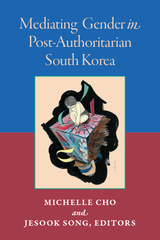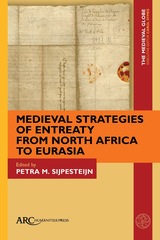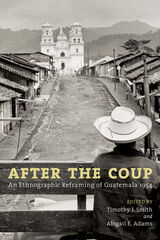
Recent research and the release of newly declassified U.S. government documents underscore the importance of reading Guatemala's current history through the lens of 1954. Scholars and researchers who have worked in Guatemala from the 1940s to the present articulate how the coup fits into ethnographic representations of Guatemala. Highlighting the voices of individuals with whom they have lived and worked, the contributors also offer an unmatched understanding of how the events preceding and following the coup played out on the ground.
Contributors are Abigail E. Adams, Richard N. Adams, David Carey Jr., Christa Little-Siebold, Judith M. Maxwell, Victor D. Montejo, June C. Nash, and Timothy J. Smith.
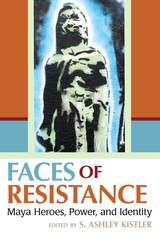
In the sixteenth century, Q’eqchi’ Maya leader Aj Poop B’atz’ changed the course of Q’eqchi’ history by welcoming Spanish invaders to his community in peace to protect his people from almost certain violence. Today, he is revered as a powerful symbol of Q’eqchi’ identity. Aj Poop B’atz’ is only one of many indigenous heroes who has been recognized by Maya in Mexico and Guatemala throughout centuries of subjugation, oppression, and state-sponsored violence.
Faces of Resistance: Maya Heroes, Power, and Identity explores the importance of heroes through the analyses of heroic figures, some controversial and alternative, from the Maya area. Contributors examine stories of hero figures as a primary way through which Maya preserve public memory, fortify their identities, and legitimize their place in their country’s historical and political landscape. Leading anthropologists, linguists, historians, and others incorporate ethnographic, ethnohistoric, and archival material into their chapters, resulting in a uniquely interdisciplinary book for scholars as well as students.
The essays offer the first critical survey of the broad significance of these figures and their stories and the ways that they have been appropriated by national governments to impose repressive political agendas. Related themes include the role of heroic figures in the Maya resurgence movement in Guatemala, contemporary Maya concepts of “hero,” and why some assert that all contemporary Maya are heroes.
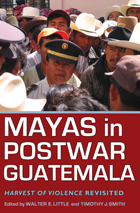
Like the original Harvest of Violence, published in 1988, this volume reveals how the contemporary Mayas contend with crime, political violence, internal community power struggles, and the broader impact of transnational economic and political policies in Guatemala. However, this work, informed by long-term ethnographic fieldwork in Mayan communities and commitment to conducting research in Mayan languages, places current anthropological analyses in relation to Mayan political activism and key Mayan intellectuals' research and criticism. Illustrating specifically how Mayas in this post-war period conceive of their social and political place in Guatemala, Mayas working in factories, fields, and markets, and participating in local, community-level politics provide critiques of the government, the Maya movement, and the general state of insecurity and social and political violence that they continue to face on a daily basis. Their critical assessments and efforts to improve political, social, and economic conditions illustrate their resiliency and positive, nonviolent solutions to Guatemala’s ongoing problems that deserve serious consideration by Guatemalan and US policy makers, international non-government organizations, peace activists, and even academics studying politics, social agency, and the survival of indigenous people.
Walter E. Little is Associate Professor of Anthropology at the University of Albany, SUNY.
Timothy J. Smith is Assistant Professor of Anthropology at the Appalachian State University.
CONTRIBUTORS
Abigail E. Adams / José Oscar Barrera Nuñez / Peter Benson / Barbara Bocek / Jennifer L. Burrell / Robert M. Carmack / Monica DeHart / Edward F. Fischer / Liliana Goldín / Walter E. Little / Judith M. Maxwell / J. Jailey Philpot-Munson / Brenda Rosenbaum / Timothy J. Smith / David Stoll

“A wonderfully vivid account of the momentous era they lived through, underscoring the chaotic, often improvisatory circumstances that attended the birth of the fledgling nation and the hardships of daily life.”
—Michiko Kakutani, New York Times
In 1762, John Adams penned a flirtatious note to “Miss Adorable,” the 17-year-old Abigail Smith. In 1801, Abigail wrote to wish her husband John a safe journey as he headed home to Quincy after serving as president of the nation he helped create. The letters that span these nearly forty years form the most significant correspondence—and reveal one of the most intriguing and inspiring partnerships—in American history.
As a pivotal player in the American Revolution and the early republic, John had a front-row seat at critical moments in the creation of the United States, from the drafting of the Declaration of Independence to negotiating peace with Great Britain to serving as the first vice president and second president under the U.S. Constitution. Separated more often than they were together during this founding era, John and Abigail shared their lives through letters that each addressed to “My Dearest Friend,” debating ideas and commenting on current events while attending to the concerns of raising their children (including a future president).
Full of keen observations and articulate commentary on world events, these letters are also remarkably intimate. This new collection—including some letters never before published—invites readers to experience the founding of a nation and the partnership of two strong individuals, in their own words. This is history at its most authentic and most engaging.

John Adams wrote to his wife Abigail that her letters “give me more entertainment than all the speeches I hear. There is more good Thoughts, fine strokes and Mother Wit in them than I hear in the whole Week. An Ounce of Mother Wit is worth a Pound of Clergy.” The Quotable Abigail Adams invites you to enjoy Abigail Adams’s wit and wisdom on a wide range of subjects, drawn from writings throughout her lifetime. Abigail shared her penetrating and often humorous observations with correspondents ranging from friends and neighbors to family members to heads of state, offering lively opinions on human nature, politics, culture, and family life. Selected and arranged by topic, these quotations provide an entertaining introduction to the thought and character of America’s founding mother. They are accompanied by a biographical introduction, source notes, chronology, and a comprehensive index, making this book the primary resource for those meeting this remarkable woman for the first time as well as for her longtime admirers.
“The Service of this Government is not a Bed of Roses, in any department of it.”
“A Nation which does not respect itself, cannot expect to receive it from others.”
“Gentlemen are not half as particular as the Ladies are in their details.”
“No woman of sense will ever make her Husband an object of Ridicule; for in proportion as she lowers him she lessens herself.”
“A woman may forgive the man she loves an indiscretion, but never a neglect.”
“There is no musick sweeter in the Ears of parents, than the well earned praises of their children.”
“Better is a little contentment than great Treasure; and trouble therewith.”
“Time, which improves youth, every year furrows the brow of age."
READERS
Browse our collection.
PUBLISHERS
See BiblioVault's publisher services.
STUDENT SERVICES
Files for college accessibility offices.
UChicago Accessibility Resources
home | accessibility | search | about | contact us
BiblioVault ® 2001 - 2024
The University of Chicago Press




